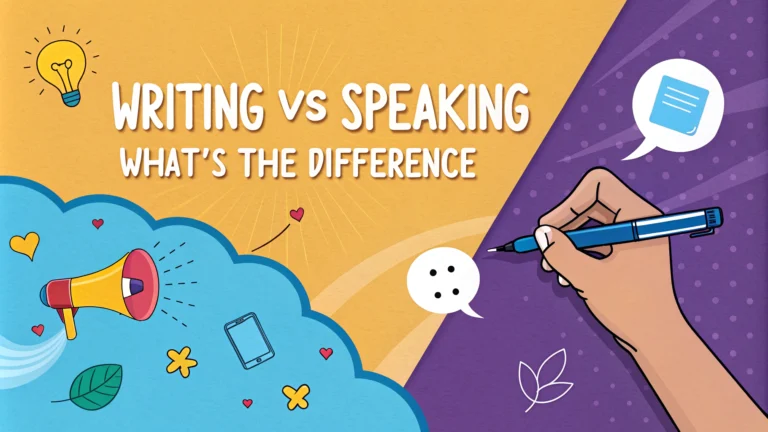The skills of writing and speaking shape our daily interactions in different yet complementary ways. **Communication methods** have unique strengths that serve different purposes in personal and professional settings.
Clear understanding of these differences helps you choose the right approach for each situation and improve your overall communication skills. From **business presentations** to **social media posts**, knowing when to write versus speak can make your message more effective.
Key Differences Between Written and Spoken Communication
**Permanence** sets writing apart from speaking – written words leave a lasting record while spoken words exist in the moment. Writing allows for careful editing and revision, while speaking demands quick thinking and immediate responses.
- Writing: Permanent, can be reviewed multiple times
- Speaking: Temporary, immediate impact
- Writing: More formal structure required
- Speaking: Natural pauses and informal flow accepted
When to Choose Writing Over Speaking
Select writing when your message needs to be **precise** and **documented**. Writing works best for:
- Complex technical information
- Legal documentation
- Detailed instructions
- Formal business communications
- Situations requiring exact wording
Effective Speaking Situations and Benefits
Speaking excels in situations requiring **personal connection** and **immediate feedback**:
- Team discussions and brainstorming
- Emotional or sensitive conversations
- Quick decision-making scenarios
- Building rapport and relationships
| Aspect | Writing | Speaking |
|---|---|---|
| Time to Process | Extended | Immediate |
| Feedback | Delayed | Instant |
| Formality | Usually Higher | Usually Lower |
Balancing Speed and Quality in Project Workflows
- **Time management** challenges affect both individual productivity and team output
- Quality control becomes harder as project pace increases
- Finding the right balance leads to better results with fewer revisions
Setting Clear Performance Standards
Creating measurable quality benchmarks helps maintain standards even under tight schedules:
- Define specific quality metrics for each project phase
- Establish review checkpoints at key milestones
- Document acceptable margins of error
- Create checklists for common tasks
Smart Planning and Resource Allocation
Match resources to project demands while keeping deadlines realistic:
| Resource Type | Optimization Strategy |
|---|---|
| Team Members | Assign based on expertise |
| Time Blocks | Buffer for unexpected issues |
| Tools/Equipment | Schedule around peak usage |
Implementing Quality Control Systems
Build quality checks into your workflow:
- Use automated testing where possible
- Create peer review protocols
- Set up feedback loops
- Track error patterns
Maximizing Team Efficiency
Optimize team performance without sacrificing work quality:
> “Small improvements in multiple areas create significant overall gains”
- Break large tasks into manageable chunks
- Rotate responsibilities to prevent burnout
- Use time-tracking tools mindfully
- Schedule focused work blocks
Building a Continuous Improvement Culture
Foster an environment that values both speed and excellence:
- Regular team feedback sessions
- Skills development opportunities
- Process refinement workshops
- Recognition for quality achievements
Measuring Success and Adjusting Course
Track progress using key performance indicators:
- Project completion rates
- Quality scores
- Client satisfaction levels
- Team productivity metrics
Moving Forward with Balanced Operations
Remember these key points for maintaining quality while meeting deadlines:
- Regular system reviews keep workflows efficient
- Team communication prevents quality drops
- Flexibility allows for necessary adjustments
- Documentation helps maintain standards
FAQs About Writing vs Speaking
General FAQs
Q: What are the main differences between written and spoken communication?
A: Written communication is more formal, permanent, and structured, while spoken communication is spontaneous, immediate, and includes non-verbal elements like tone and body language.
Q: Is writing or speaking more effective for learning a language?
A: Both skills complement each other. Speaking helps with fluency and real-time communication, while writing improves grammar accuracy and vocabulary retention.
Q: How does vocabulary differ in writing versus speaking?
A: Written vocabulary tends to be more:
- Formal and sophisticated
- Precisely chosen
- Varied and extensive
Spoken vocabulary is typically:
- More casual and conversational
- Repetitive
- Context-dependent
Long-tail Keyword FAQs
Q: How to improve writing skills for academic papers vs public speaking?
A: Academic writing requires structured arguments, proper citations, and formal language. Public speaking focuses on clarity, engagement, and memorable delivery.
Q: What’s the difference between business email writing and presentation speaking?
A: Business emails need clear subject lines, concise content, and professional tone. Presentations require engaging delivery, visual aids, and audience interaction.
Q: Why do people write differently than they speak in professional settings?
A: Professional writing follows style guides and formal conventions, while professional speaking balances formality with conversational elements to maintain audience engagement.
Q: How does grammar differ between written and spoken English?
A: Written grammar is more rigid and follows standard rules. Spoken grammar often includes:
- Incomplete sentences
- Contractions
- Informal structures
Q: What are the benefits of writing vs speaking for memory retention?
A: Writing typically leads to better long-term retention due to the slower, more deliberate process. Speaking helps with immediate recall and practical application.
| Aspect | Writing | Speaking |
|---|---|---|
| Permanence | Permanent record | Temporary |
| Editing | Can be revised | Real-time, no editing |
| Feedback | Delayed | Immediate |



















